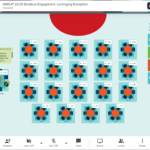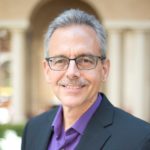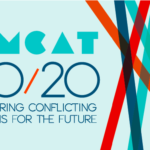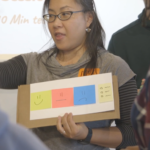WMCAT 20/20 Participant Reflection: Is The American Dream Just A Mirage?
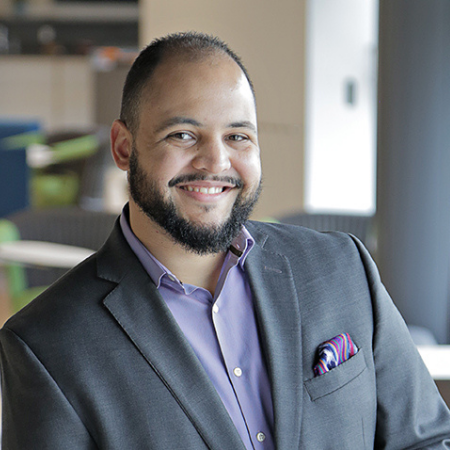
By Anthony Tuttle
Anthony is a participant in the eight-month series, WMCAT 20/20: Exploring Conflicting Visions for the Future, hosted by the West Michigan Center for Arts + Technology (WMCAT). The April 8, 2021 Community Meeting included content contributors Kenyatta Brame, Marissa Guananja, Rashika Lee, David Croom, and Ritsu Katsumata. This blog is a reflection on the presentation, “The American Dream: When Work Doesn’t Work.” Learn more at wmcat2020.org.
Bootstraps aren’t meant for picking yourself up, but no one really tells you that. And even if they were, they also don’t tell you that oftentimes your bootstraps aren’t enough.
As a WMCAT employee, I work at the intersection of systems and structures that are tied to education, economic prosperity, and social capital. These systems are meant to positively affect individuals in our community, but unfortunately (and more often than you might think), they fall short because they’re rooted in injustice. We do our best to intentionally seek out the voices that aren’t being heard and champion equitable access to resources every day, but this work is complicated and can feel overwhelming. Despite living in one of the most philanthropic cities in the nation with so many other community-based non-profit organizations trying to solve hard problems, it can feel defeatist at times.
It’s uplifting, and powerful – and relatively easy – to use the success stories of former students to help progress our work. It’s much harder, though (and much less enjoyable) to share the stories of students who enthusiastically do everything we ask to complete our programs but still aren’t able to overcome the many barriers to starting a new career, earning a living wage, and being fulfilled in their work.
We know this definitely is not a failure of our students and other individuals who put in the hard work to make social and economic progress in their lives and community, but one way or another, the system isn’t working for them. Like so many other topics we’ve explored throughout WMCAT 20/20, the circumstances that create the Benefits Cliff are nuanced and complicated; they’re interconnected and deeply entrenched in the structural and institutional systems we all rely on but that fall short of supporting the most vulnerable among us. Yes, it’s messy…but having identified the blind spots, what’s being done to fix it?
The solutions highlighted by this month’s speakers started with a recognition that there is no single “silver bullet” remedy…a multi-faceted problem needs a multi-faceted solution. One of the things that really resonated with me is how powerful (and easy!) it is to simply recognize the basic humanity of individuals looking to improve their lives. Everyone’s American Dream is different – it isn’t “one size fits all” – and that’s both the beauty and the inherent challenge of our collective struggle. Additionally, it was beyond heartening to hear an executive vice president reject the dominant notion that the sole focus of business is (or should be) to increase shareholder value; instead, he emphasized a fiduciary obligation to focus on the “triple bottom line” – People, Planet, and Profit.
This month we heard from Rashika Lee – WMCAT Graduate & Senior Biller at Spectrum Health – that, at our core, everyone is looking for fulfillment through dignity of work, permission (and the ability to strive) to improve, and a sense of accomplishment when we achieve the goals we set out for ourselves. From the policy perspective, David Croom – Assistant Director of Ascend at The Aspen Institute – shared that access to affordable, high-quality child care, removing the stigma around and increasing access to mental health care resources, and providing holistic employee support are all important steps to supporting individuals in their journey to better-supporting themselves and their families. And to elaborate on what “holistic employee support” can look like, Kenyatta Brame – Executive Vice President at Cascade Engineering – discussed how employers should proactively seek out and eliminate as many barriers to employment as possible because, when you’re focused on the triple bottom line instead of increasing shareholder value, “companies can’t outperform the community.”
I admit that I listen to a lot of podcasts, and after this month’s WMCAT 20/20 Community Meeting, I’m continually reminded of a few of the stories over the past year: Why Centering Black Women in The Economy Could Benefit Everyone and all eight episodes of The Uncertain Hour – Season 5. In lieu of listening to those stories yourself (which I still highly encourage you to do anyway), I’ll ask you simply to join me in imagining how many dreams we can help the individuals in our communities realize – locally, regionally, nationally, and globally – when we intentionally center our systems around those who could use the most help….because if it works for them, it’ll certainly work for everyone else.
ABOUT THE AUTHOR
Anthony is working to increase awareness, build excitement around, and provide equitable access to cyber security trainings and other technology resources in our community. WMCAT is home to the region’s only neutrally-located, community-based Cyber Hub for workforce development in the IT and cyber security sectors. Anthony is leading WMCAT’s efforts to build a diverse and inclusive cyber security and technology talent pipeline in West Michigan.
Before joining WMCAT, Anthony worked in marketing at Steelcase where he focused on the intersection of furniture and technology, and managed multiple products that solved for the needs of both end users and IT decision makers.
At heart, Anthony is a learner and an educator who is passionate about equipping individuals – especially those with multicultural backgrounds and from underrepresented communities – with the knowledge and skills that will develop them holistically, allow them to make economic progress in their lives, and make positive impacts in their communities.
Anthony earned a Bachelor of Science in Technology, Engineering, and Design Education from North Carolina State University and a Master of Arts in Management from the Wake Forest University School of Business.
